 North Korea Increases Aid to Russia, Mos... Tue Nov 19, 2024 12:29 | Marko Marjanovi? North Korea Increases Aid to Russia, Mos... Tue Nov 19, 2024 12:29 | Marko Marjanovi?
 Trump Assembles a War Cabinet Sat Nov 16, 2024 10:29 | Marko Marjanovi? Trump Assembles a War Cabinet Sat Nov 16, 2024 10:29 | Marko Marjanovi?
 Slavgrinder Ramps Up Into Overdrive Tue Nov 12, 2024 10:29 | Marko Marjanovi? Slavgrinder Ramps Up Into Overdrive Tue Nov 12, 2024 10:29 | Marko Marjanovi?
 ?Existential? Culling to Continue on Com... Mon Nov 11, 2024 10:28 | Marko Marjanovi? ?Existential? Culling to Continue on Com... Mon Nov 11, 2024 10:28 | Marko Marjanovi?
 US to Deploy Military Contractors to Ukr... Sun Nov 10, 2024 02:37 | Field Empty US to Deploy Military Contractors to Ukr... Sun Nov 10, 2024 02:37 | Field Empty Anti-Empire >>
Indymedia Ireland is a volunteer-run non-commercial open publishing website for local and international news, opinion & analysis, press releases and events. Its main objective is to enable the public to participate in reporting and analysis of the news and other important events and aspects of our daily lives and thereby give a voice to people.
 Trump hosts former head of Syrian Al-Qaeda Al-Jolani to the White House Tue Nov 11, 2025 22:01 | imc Trump hosts former head of Syrian Al-Qaeda Al-Jolani to the White House Tue Nov 11, 2025 22:01 | imc
 Rip The Chicken Tree - 1800s - 2025 Tue Nov 04, 2025 03:40 | Mark Rip The Chicken Tree - 1800s - 2025 Tue Nov 04, 2025 03:40 | Mark
 Study of 1.7 Million Children: Heart Damage Only Found in Covid-Vaxxed Kids Sat Nov 01, 2025 00:44 | imc Study of 1.7 Million Children: Heart Damage Only Found in Covid-Vaxxed Kids Sat Nov 01, 2025 00:44 | imc
 The Golden Haro Fri Oct 31, 2025 12:39 | Paul Ryan The Golden Haro Fri Oct 31, 2025 12:39 | Paul Ryan
 Top Scientists Confirm Covid Shots Cause Heart Attacks in Children Sun Oct 05, 2025 21:31 | imc Top Scientists Confirm Covid Shots Cause Heart Attacks in Children Sun Oct 05, 2025 21:31 | imc Human Rights in Ireland >>
 Ten Dead in Bondi Beach Terror Attack Sun Dec 14, 2025 11:05 | Jonathan Barr Ten Dead in Bondi Beach Terror Attack Sun Dec 14, 2025 11:05 | Jonathan Barr
At least ten people, including children, are dead after gunmen opened fire during a Hanukkah party on Bondi Beach in Sydney.
The post Ten Dead in Bondi Beach Terror Attack appeared first on The Daily Sceptic.
 Beano Brain: Why Does the Beano Have its Own Special In-House Child Psychology Unit? Sun Dec 14, 2025 09:00 | Steven Tucker Beano Brain: Why Does the Beano Have its Own Special In-House Child Psychology Unit? Sun Dec 14, 2025 09:00 | Steven Tucker
In the good old days, children's comics had one purpose: to be funny. Now, the Beano sees its mission as 'mental health' ? and has its own in-house child psychology unit to keep it on message, says Steven Tucker.
The post Beano Brain: Why Does the Beano Have its Own Special In-House Child Psychology Unit? appeared first on The Daily Sceptic.
 America?s New Security Doctrine and the Reordering of Global Energy Geopolitics Sun Dec 14, 2025 07:00 | Tilak Doshi America?s New Security Doctrine and the Reordering of Global Energy Geopolitics Sun Dec 14, 2025 07:00 | Tilak Doshi
Washington's newly released National Security Strategy has struck Europe with the force of a long-suppressed truth bluntly delivered ? and energy geopolitics is at the heart of the seismic shift, says Tilak Doshi.
The post America’s New Security Doctrine and the Reordering of Global Energy Geopolitics appeared first on The Daily Sceptic.
 News Round-Up Sun Dec 14, 2025 00:45 | Will Jones News Round-Up Sun Dec 14, 2025 00:45 | Will Jones
A summary of the most interesting stories in the past 24 hours that challenge the prevailing orthodoxy about the ?climate emergency?, public health ?crises? and the supposed moral defects of Western civilisation.
The post News Round-Up appeared first on The Daily Sceptic.
 Greens Plan to Punish Men Who Correct Women Sat Dec 13, 2025 17:38 | Will Jones Greens Plan to Punish Men Who Correct Women Sat Dec 13, 2025 17:38 | Will Jones
Men who correct women could face disciplinary action under plans being considered by the Green Party.
The post Greens Plan to Punish Men Who Correct Women appeared first on The Daily Sceptic. Lockdown Skeptics >>
Voltaire, international edition
 Will intergovernmental institutions withstand the end of the "American Empire"?,... Sat Apr 05, 2025 07:15 | en Will intergovernmental institutions withstand the end of the "American Empire"?,... Sat Apr 05, 2025 07:15 | en
 Voltaire, International Newsletter N?127 Sat Apr 05, 2025 06:38 | en Voltaire, International Newsletter N?127 Sat Apr 05, 2025 06:38 | en
 Disintegration of Western democracy begins in France Sat Apr 05, 2025 06:00 | en Disintegration of Western democracy begins in France Sat Apr 05, 2025 06:00 | en
 Voltaire, International Newsletter N?126 Fri Mar 28, 2025 11:39 | en Voltaire, International Newsletter N?126 Fri Mar 28, 2025 11:39 | en
 The International Conference on Combating Anti-Semitism by Amichai Chikli and Na... Fri Mar 28, 2025 11:31 | en The International Conference on Combating Anti-Semitism by Amichai Chikli and Na... Fri Mar 28, 2025 11:31 | en Voltaire Network >>
|
Charlie Donnelly memorial unveiled
 international |
history and heritage |
news report international |
history and heritage |
news report
 Friday April 02, 2010 21:50 Friday April 02, 2010 21:50 by the leveller by the leveller

Remembering
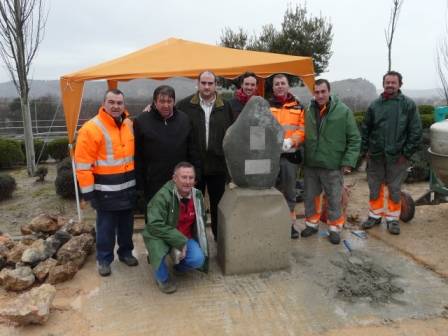 RIVAS COUNCIL WORKERS CHARLIE DONNELLY MEMORIAL UNVEILED JARAMA FEB. 27 2010
A large international gathering of family, friends and relatives of Brigaders from the USA, Britain, Ireland, France and many Spanish supporters, with the Irish ambassador and five Spanish war Veterans, came to Rivas Vaciamadrid on that Saturday, for the unveiling of a stone monument to Tyrone poet and political activist, Charlie Donnelly, who was killed nearby during the battle of Jarama on that date 73 years ago.
The site was provided by the council of Rivas, in a small floral park, parque Miralrío, overlooking the battlefield, with the Donnelly stone backed by a single olive tree. This was the 7th annual Jarama march, which had been started by historian Seve Montero and Irish veteran Bob Doyle in 2003. Over the years, increasing numbers turned up from Madrid, and later from Ireland and the UK. Four years ago an organised group,including the Friends of Charlie Donnelly, began supporting the event, aiming to have a memorial for Charlie in the Jarama area, similar to the one which had been erected in his native Dungannon .
While commitments and promises to further the project for the Donnelly memorial were agreed by all at the meal in the El Cid restaurant after that 2007 march, the actual work eventually was completed by the Friends of Charlie Donnelly,AABI and the council of Rivas.
A network of a dozen Irish worked here to develop broad support in the media and amongst political and interested groups, culminating with a lively and very profitable fundraising night of song and music in the Teachers’ Club, Parnell Square, Dublin. People were asked to sponsor one of the 32 stones coming from every county in Ireland, as the base for the main stone with the plaques, and the response exceeded all expectations, so that while many expenses weren’t covered for the five who travelled out early to Rivas to erect the base and main stone before the ceremony, the final donations which are still arriving should see all expenses paid for. The building work and gathering of the matching stones from the battlefield was done under wet, cold and windy February weather, much like the conditions that the armies experienced there in 1937, but with the ready help of the Rivas council staff, from the Mayor and Cultural Councillor down, all was got ready in time.
The building work was done by Eddie O’Neill, Sean Walsh, Rob Jackson, Kevin Maguire, Stevie Moore and their one man video team, Gabriel Cleary, with local arrangements handled by Isabel Pinar, Elisa Retana Vallely and Seve Montero . The Weekends events started on Friday night when historian Richard baxell gave a lecture on the British battalion in the battle of Jarama. Aided by a powerpoint presentation delineating the battlefield he ended with some words addressed to Charlie Donnelly and the Lincoln Battalionhe belonged to.The large mixed audience of Spanish,British and Irish were deeply impressed by Baxells knowledge and attention to detail. After the lecture tapas and food was enjoyed in the nearby bar..
While the Saturday was preceded by possibly the worst weather forecast for anywhere in Spain this year, the day came, overcast and with a few light drops early on, but good overall.
The opening ceremony took placein the Miralrio park in the Rivas suburbs, with three members of the Irish folk group, Puca Og, and speakers were presented by Isabel Pinar; the president of the Madrid Association of Friends of the International Brigades, Angel Rojo welcomed us, followed by an ex member of parliament Angeles Maestro who had proposed the law granting veterans of the brigades Spanish citizenship. Other speakers who addressed those assembled at the event were Dungannon Councillor Barry Monteith, Harry Owens, Neil Donnelly (who read his mother Kay’s speech) spokesperson for the Donnelly family and Justin Harman the Irish ambassador who reminded all that, as far back as the crucial inauguration of the first republican Jarama memorial in nearby Morata cemetery, historic memory was a concept supported by the Irish government, after which 92 year old Spanish veteran Piedad Arribas gave a rousing speech defending the Republic and what their fight meant, and the Mayor or Rivas, Jose Masa closed with his own words of appreciation for the brigades and Charlie Donnelly. The unveiling ended with Ian’s solo “Danny Boy” and everyone joining in a spirited rendering of the International.
Next stop was the site where the 15th brigade fought on the battlefield, and Seve Montero explained the layout of the forces during the fighting there, then sandwiches, vino and posters were given out by local communist party workers, and once again we heard a newly composed ballad by Quique Sabate on Charlie Donnelly with a rebeck. On behalf of his family Neil Donnelly thanked once more all that was done to honour the the memory of his uncle Charlie. He was the presented with a badge dated back to the civil war bearing the Spanish civil war flag.
Most of us made it to Meson el Cid down the road in Morata, but some brave souls who followed a Liverpool accent ended up on remoter parts of this rural battlefield than anyone had intended. For the first time since the original plaque was unveiled in the Morata cemetery in 1994, we filled the entire restaurant with a noisy, happy throng. After which the Friends of Charlie Donnelly presented key helpers with commemorative gifts from Tyrone.
The odd lone visitor to the cemetery on the far side of this small farming town found the site in Morata cementery where up to 5,000 republican defenders remains had been dumped after the war, which was still girded in flowers beneath the huge white marble plaque with its gold lettering, and a candle which had been left alight, set in a red holder, burning lower in the evening light.
The concert and poetry reciting at the UGT hall on Maldonado 53 was by all accounts a great session, Puca Og excelled themselves musically .their music and the Irish dance performance by Rosalia Halls Plaza de Castilla dance group was thoroughly enjoyed. When eventually they got us out, the party went on in a nearby tavern till 5.20am, when the pub ran dry and the hoarse voices fell silent.
The outing to Brunete battlefield on the Sunday morning with Alan Warren’s group began with a small but important misunderstanding, when the bus due to leave at 9.30am left at 9.15, and some eight or nine Irish visitors were left behind. The busload which got away saw several essential areas of this famous site, where many Irish, British and Americans died in July, 1937, including Mosquito Hill which Franco forces held against repeated Brigade attacks, and where Oliver Law, the first negro to command white US soldiers in war, was killed. Trenches were still visible, and Ernesto Vinas local enthusiasts who guided us, explained the significance of battlefield debris, then having had our sandwiches provided by Claudia and company, the bus headed back to town.
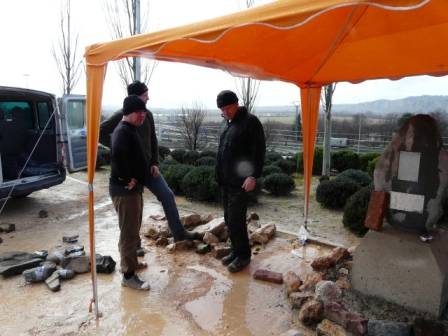
IT RAINS IN SPAIN
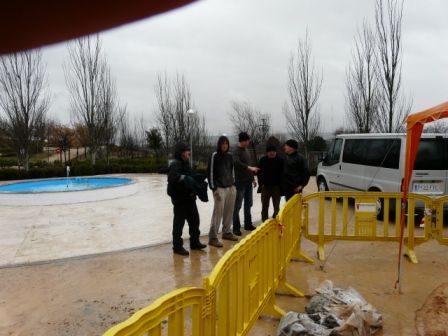
AND THEN MORE RAIN!
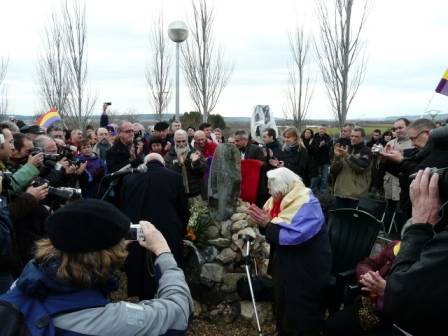
THE STONE UNVEILED
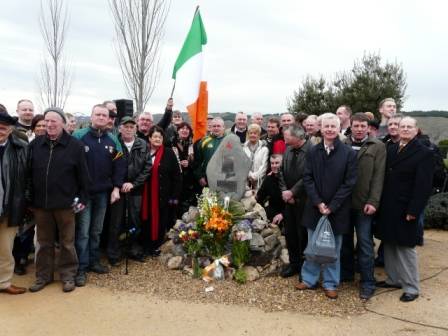
FRIENDS OF CHARLIE DONNELLY
|
 international |
history and heritage |
news report
international |
history and heritage |
news report
 Friday April 02, 2010 21:50
Friday April 02, 2010 21:50 by the leveller
by the leveller

 by asile - ABBI
by asile - ABBI Fri Apr 02, 2010 23:23
Fri Apr 02, 2010 23:23


 by johnny on the tear
by johnny on the tear Fri Apr 02, 2010 22:20
Fri Apr 02, 2010 22:20


 by Ciarán
by Ciarán Fri Apr 02, 2010 22:14
Fri Apr 02, 2010 22:14






























 printable version
printable version

 Digg this
Digg this del.icio.us
del.icio.us Furl
Furl Reddit
Reddit Technorati
Technorati Facebook
Facebook Gab
Gab Twitter
Twitter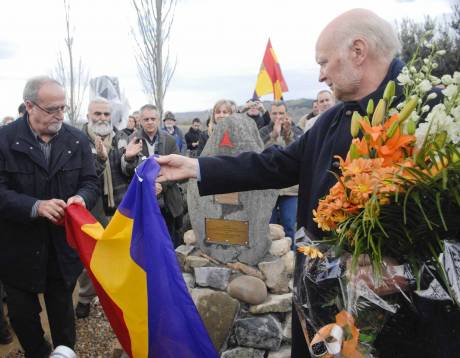
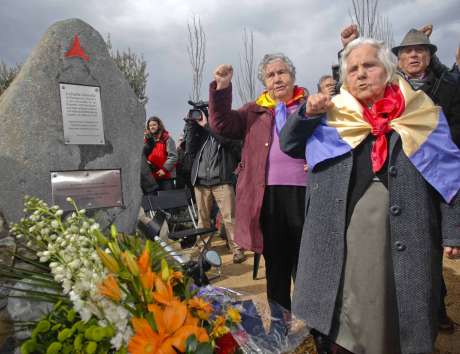
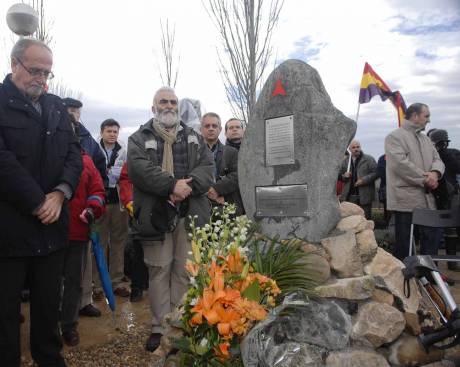
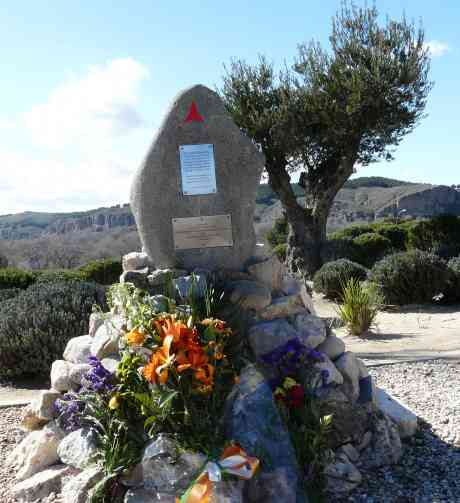
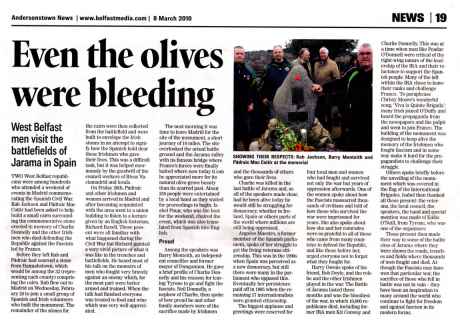

View Comments Titles Only
save preference
Comments (5 of 5)
Jump To Comment: 5 4 3 2 1Congratulations to everyone involved in creating this fantastic memorial to Tyrone man Charlie Donnelly.
As for ourselves, North West Spanish Civil War Project, we are aiming toerect a lasting memorial to honour the role played by volunteers such as Charlie Donnelly and many others from the North West of Ireland who participated in the International Brigades.
At the moment we are planning events to place here in Derry on October of 2010 to remember the volunteers who came together in a foreign land, sacrificing their lives for an ideal, in defense of the Spanish Republic.
To get in touch with the project, participate in events or to make a donation please email: xvbrigade@hotmail.com
For all donations please make cheques & postal orders payable to
North West Spanish Civil War Project
First Trust Bank, Meadowbank, Derry
National Sort Code: 93-84-83
Account Number: 07715-011
Here is the article that was published in El País the following day.
The hill Donnelly defended
Rivas devotes a monument to the brigaders who fought for the Republic
JERÓNIMO ANDREU - Madrid - 28/02/2010
Charlie Donnelly was born in 1914 in the Dungannon valleys, Ireland, and he died at 23 at the Jarama battle. He was shot in the arm, the abdomen and the head. Donnelly was not a soldier. He survived the war in Spain over a month. He was a young poet who wrote a handful of poems at university and whose literary recognition came about after his death. He was defending Suicide Hill on the last day of the Jarama battle. He was surrounded by fascist soldiers, taking refuge behind an olive tree, a Canadian comrade heard him murmur under the thundering of machine guns fired against their company: ‘Even the olives are bleeding’. This is what the witness repeated to the Irish writer Joseph O'Connor –the brother of singer Sinéad O'Connor-, who used the quote to entitle the poets biography. A few minutes after uttering this sentence, Donnelly was fatally hit . It was February 27th 1937. His comrades were not able to recover his body until March 10th to bury him by the Jarama.
Yesterday, 72 years after his death, a monument made with Dungannon stone was unveiled in Miralrío park in Rivas to commemorate the writer, journalist and political activist Donnelly. The monument is a tribute to the soldiers of the International Brigades. About 60.000 volunteers arrived in Spain from 54 countries to fight for the Republic. 10.000 died in combat. 3.000 of which in the Jarama battle.
International brigaders’ writings bear witness to the romanticism with which they faced their adventurous duty. In a book presented these days in Rivas within the Jarama battle commemoration ‘Speaking of leyends, poems for Spain’ (Baile del Sol editions), Jim Jump, Antonio Díez and David González have gathered the poems of some of the 2.300 volunteers from the United Kingdom and Ireland devoted to their war experience. The book includes poems by Donnelly and other writers.
Verses witten in letters or diaries, scribbled on the margins of the books soldiers read during unending intervals between battle break out, or on the back of military orders. They were sometimes written to encourage soldiers and they were published in the Brigades newsletters, other times they were sent off to family members or were kept as a personal token of remembrance of the disaster. A third type are the writings brigaders produced on their return, and are significant of the scar war had imprinted in their memories. David Martin, one of the authors included in the anthology, wrote many years after he returned: "Poetry is not expansive, it is compressive like a twisted wire. With a hard and spiky core. In Spain everyhting was harsh and brutal”.
It is common in the anglosaxon world to refer to the Civil War as the war of ‘the poets’. This labeling irritates the combatants, 80% of which were workers. However it is undeniable that the conflict sublimated a certain type of intellectual and artistic commitment. A clear example is that of John Cornford, archetype of the young creator of the thirties, an adventurous and prestigious intellectual marxist who blended political reflection together with verses on love and fear in his war production. Before he died in the battlefield he left his girlfriend the raw ‘To Margot Heinemann’, one of the poetical symbols of the war included in the published compilation.
In October 1938, Dolores Ibárruri bade farewell to the surviving brigaders in Barcelona: "We won’t forget you, and, when the olive of peace flourishes intertwined with the laurels of victory for the Spanish Republic, come back!". Brigaders have regularly visited Spain ever since the end of the dictatorship. There was none yesterday at the unveiling of the monument to Donnelly. There was a delegation from Dungannon. Jack Edwards, one of the 40 brigaders that are still alive, was intended to come, but was not able to because of health problems. "It is very difficult", says Ángel Rojo, president of the Association of Friends of the International Brigades: "Three of the four Cuban brigaders that were left have died this week. It has been a very hard winter ".
Rojo’s association battles time and neglect. And something else: the disenchanted lucidity with which many heroes read history. Another brigader, David Marshall, wrote before he died:
"These are my comrades, my friends (...). They lay in unmarked graves / without ceremony, their songs forgotten, / our children don’t learn their history ".
"And you forget them under your responsibility / for, though you fight as well as they, / you’ll be betrayed, like we were ".
At the battle field